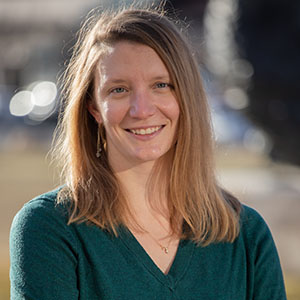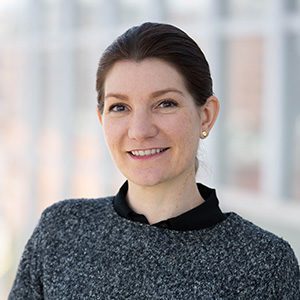In alignment with the 1990 Native American Graves Protection and Repatriation Act, Metropolitan State University of Denver has served as a temporary steward of the skeletal remains of 13 Native and Indigenous people recovered throughout Colorado by various external entities.
While earlier efforts were unsuccessful, MSU Denver has renewed efforts to determine the deceased individuals’ geographical and cultural affiliations and to return the remains to the appropriate Native communities, where they can be honored and reinterred.
Sharing the University’s resources and expertise
In the 1980s, the MSU Denver Department of Sociology and Anthropology temporarily accepted the skeletal remains of 13 individuals believed to be Native or Indigenous to these lands. The remains of one individual were brought to the department by a private citizen in the 1980s. As the donor did not provide any supporting information or documentation, the remains’ origin and possible tribal affiliations cannot be determined. The other 12 individuals’ remains originated as inadvertent discoveries from archaeological excavations in Colorado.
Respectfully housed in alignment with NAGPRA
After accepting the Native remains on temporary terms, University historians and anthropologists began investigating their origin in hopes of returning them to the appropriate tribal leaders. Despite attempting consultation with area tribes in the 1990s, the University was unable to determine the origins of the remains. In the interim, the University has maintained the remains privately and safely in a manner that respects the dignity of the person to whom they belonged. The remains have never been used for teaching or research purposes.

“MSU Denver has adhered to NAGPRA processes, procedures and requirements during its stewardship of the Native remains,” said Michala Stock, Ph.D., D-ABFA, associate professor with the Department of Sociology and Anthropology and director of the Human Identification Lab. “Following NAGPRA protocol and legal guidelines, the remains were inventoried internally and included in federal inventories in 1994, prior to the 1995 deadline required by NAGPRA. However, it is time to renew these efforts and more fully engage with the spirit of the law.”
MSU Denver’s Human Identification Lab
Coroners and medical examiners often seek the scientific expertise of higher–education experts to support decedent identification and repatriation processes. For example, the University’s Human Identification Lab provides accurate, ethical and high-quality forensic–anthropology field and laboratory consultation and services to the medicolegal community of Colorado. The HIL, which no longer accepts human remains, offers off-site laboratory analysis (generally at the offices of a coroner or medical examiner), while following scientific processes that meet and exceed industry standards. Currently, no remains are brought onto campus for forensic casework.
State of Colorado procedures
The standard operating procedure within the state of Colorado regarding the inadvertent discovery or recovery of human remains is to call the local coroner or medical examiner, who may contact academic experts such as Stock to help determine age and origin. Should the remains potentially fall within NAGPRA purview, the repatriation process then shifts to NAGPRA-dedicated staff members within the Office of the State Archaeologist.
Repatriation efforts renewed
The land that is now home to the City and County of Denver and its many surrounding communities was traditionally the territory of the Cheyenne and Arapaho nations and was the site of trade, hunting, gathering and healing for an estimated 48 other tribes, including the Lakota, Ute, Kiowa, Comanche, Apache and Shoshone. MSU Denver experts believe all 13 individuals may be associated with regional tribes based on their reported locations. Current faculty members are pinpointing more exact geographical provenience, or origin, which will aid in narrowing down the most appropriate Tribal Nations to contact regarding repatriation.
Led by Stock, MSU Denver has renewed archival research and is proactively inviting tribal leaders to consult on the identification-and-repatriation process. All tribes that may have a historical connection to the remains should be contacted by mid-May.
“The University has no intention of seeking to retain possession of the skeletal remains currently housed in the HIL,” Stock said. “While more precise provenience could be ascertained via invasive procedures, these are likely counter to the wishes of the descendant community/ies — therefore the more methodical archival–research approach is necessary. By end of semester, anthropology archival research should yield further information about scope of repatriation efforts.”
Native and Indigenous students join the effort
University leaders have also engaged Native and Indigenous student groups in conversations about the care and stewardship of Native remains as well as the repatriation process and archival research. This included consulting with the Native and Indigenous Student Alliance (NISA), which hosted a smudging ceremony guided by local elders.
“We hope that an updated review of the information combined with consultation from area tribes will help facilitate their return to descendant communities,” said Deserea Richards, program coordinator for Native and Indigenous Student Support. “MSU Denver respects the Indigenous peoples still connected to this land and recognizes the sovereignty of the Native nations.”
What comes next
Even with additional support and University resources, it will likely take several months after requests go out to Tribal leaders this month to fully engage in the consultation process.
Native-Indigenous Student Support Office will continue to follow up directly with stakeholders and will report back on progress. Anthropology faculty members will manage progress around repatriation efforts.
“However, in the event that repatriation is not possible we would continue dialogues with descendant communities to come to a consensus on next steps,” Stock said.
Auraria Campus Powwow on Saturday
The Auraria Powwow Committee and Auraria NISA Circle will also host the Second Annual Auraria Campus Powwow on May 6 to honor Native graduates and students. Powwows can be a place of healing, and all are welcome to attend.


